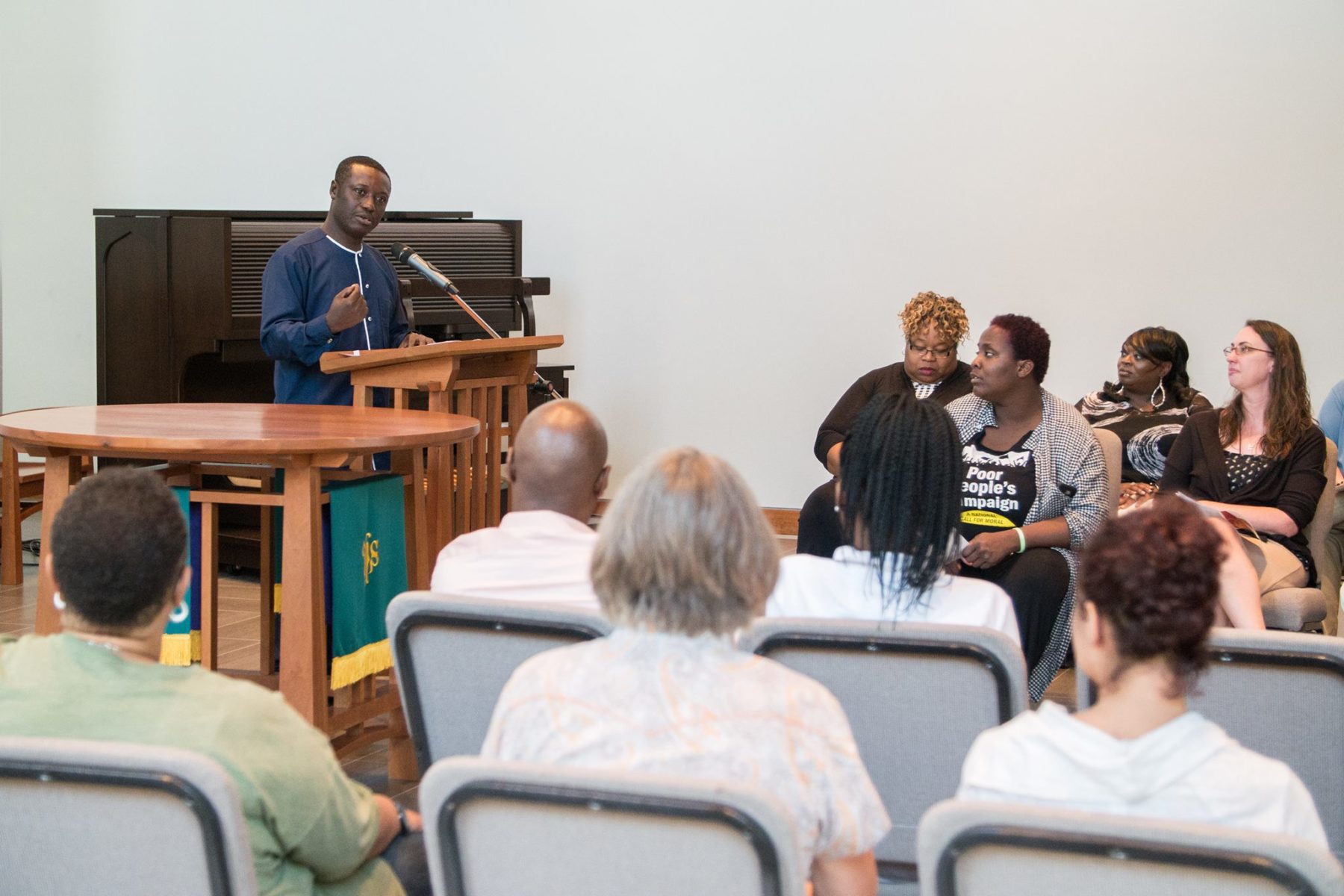Certificate in Peace and Justice Ministry
English | 100% Online | 12 credits
Become a Leader For Social Change With Peace and Justice Ministry Studies
The Certificate in Peace and Justice Ministry will prepare you to be a ministry leader if you want to serve the church and your community through social change in areas such as racial injustice, economic injustice, the climate crisis, war and violence, and more
Our faculty members are leaders in peace and justice research and social justice praxis. Through coursework that focuses on conflict resolution, peacebuilding, and social change, you will gain the knowledge and skills necessary to make an impact within a variety of communities around the world.
Online Ministry Certificate Overview
In cooperation with The Buttry Center for Peace and Nonviolence, Central Seminary offers two certificates in Peace and Justice Ministry: the Graduate Certificate and the Professional Certificate. Students in the Graduate Certificate earn 12 graduate credits upon completion of the certificate. The Professional Certificate in Peace and Justice Ministry program offers students the opportunity for professional development and continuing education.
Each certificate is designed to develop and strengthen competencies in faith leaders, community leaders, and activists who are serving in ministries of social change.
This program integrates biblical and theological literacy with hands-on peace and justice work through the use of critical pedagogy techniques (such as dialogue, reflection, and praxis). This program also prepares students to learn within their context and the issue(s) each student is passionate about.
Graduate Certificate in Peace and Justice Ministry
A Graduate Certificate in Peace and Justice Ministry will guide you in exploring the complex structural dynamics underlying issues of peace and social justice.
You’ll complete two 4-credit graduate-level courses. The program provides you with opportunities for spiritual formation and discernment about ministries of social change. You will also be equipped with a theological, biblical, and historical foundation for understanding philosophies and methods of social change work and movements for peace and justice.
Additionally, you’ll learn the application of theological, biblical, historical, and philosophical foundations within contexts of ministries of peace and justice.
Learning Outcomes
The student who successfully completes the certificate will be able to:
- Integrate spiritual practices with ministries of peace and justice
- Describe and construct theological and biblical claims for ministries of peace and justice
- Interpret, apply, and develop theories and tactics of social change
- Demonstrate appropriate communication skills (public and/or interpersonal) to lead ministries of peace of justice
Program Requirements
- Formation for Peace and Justice Ministry (4 credits)
- Peace and Justice Ministry Praxis (4 credits)
- Course Description: This course focuses on the application of theological, biblical, historical, and philosophical foundations within contexts of ministries of peace and justice. Ministry praxis (action-reflection-action) is facilitated through a total of 120 hours of supervised ministry experience within a context-oriented toward peace and justice in a faith-based setting and course content such as leading just organizations, preaching and teaching for social change, and conflict transformation. (Pre-req: Formation for Peace and Justice Ministry)
- Your choice of two of the following courses:
- Creativity in Public Ministries (2 credits, offered in various terms)
- Interpersonal Skills (2 credits, offered in various terms)
- Media for Ministry Development (2 credits, offered in various terms)
Students in the Master of Divinity program are eligible to apply one or both of these courses to their contextual learning requirement (Formation for Peace and Justice Ministry for X-CL501; Peace and Justice Ministry Praxis for X-CL521) upon consultation with the Director of Contextualized Learning. This may require an additional assignment to demonstrate the learning outcomes of the contextual learning courses.
- English Languages Offered: English
- 12 Credits Program Length: 12 credits - Two academic terms or more
- Three 12-Week Terms Calendar: Three 12-week terms per academic year. New students can begin in any term.

| Session | Start Date | Application Deadline |
|---|---|---|
| Fall 2025 (August - November or December) | August 18, 2025 | July 28, 2025 |
| Spring 2026 (January - April or May) | January 20, 2026 | December 29, 2025 |
| Summer 2026 (May - August) | May 18, 2026 | April 27, 2026 |
| Fall 2026 (August - November or December) | August 17, 2026 | July 27, 2026 |
Tuition
$410 per credit (25-26 academic year)
Registration Fee
$250 per term
Graduation Fee
$200
Start your application anytime. Classes start in August, January, and May. Application, character references, and an autobiographical statement will be required. For admission to the graduate certificate program, applicants should have a bachelor’s degree from an accredited educational institution. A limited number of students without an earned baccalaureate degree or its equivalent may be admitted to a certificate program through the completion of coursework in the Diploma program. Students participating in the English program for whom English is not their first language will be required to demonstrate their English proficiency.
Core Course 1: Formation for Peace and Justice
- Discernment for Peace and Justice Ministry Vocation Part 1
- Spiritual Practices for Justice Ministers Part 1
- Biblical and Theological Foundations for Peace and Justice Ministry
- Conflict Transformation
- Theories and Tactics of Social Change
- The Bible and the Mental Terrain for Social Change in the U.S.
- Transforming Personal and Social Traumas
- Historic and Biblical Foundations for Nonviolent Strategies of Social Change
- Histories of Struggles for Freedom
- Understanding Issues of Peace and Justice
Core Course 2: Peace and Justice Ministry Praxis
- Discernment & Spiritual Practices for Peace and Justice Ministry Part 2
- Education for Social Change
- Conflict Transformation
- Preaching and Worship for Social Change
- Leading Just Organizations
- Reading the Bible with the Oppressed
- The Bible and the Mental Terrain for Social Change in the U.S. Part 2
- Reflective Practice on Theories and Tactics of Social Change
- Arts and Culture in Peace and Justice Ministries
- Sacred Listening in Peace and Justice Ministry
Core Course Time Commitment (per week)
- 3 hours of synchronous class time
- 2 hours of asynchronous content with discussion boards
- 5 hours of supervised ministry experience
Plus your choice of two of the following courses:
- Creativity in Public Ministries (2 credits, offered in various terms)
- Interpersonal Skills (2 credits, offered in various terms)
- Media for Ministry Development (2 credits, offered in various terms)

Toya Richards
Director of Peace & Justice Ministry Certificate
Professional Certificate in Peace and Justice Ministry
The Professional Certificate in Peace and Justice Ministry is a non-degree, not-for-credit program. When you join Central’s Professional Certificate program, you will engage in a program designed for continuing education and professional development that requires completing two graduate-level courses. The program provides you with opportunities for spiritual formation and discernment toward ministries of social change, as well as theological, biblical, and historical foundations to apply to philosophies and methods of social change work, as well as an understanding of the context for movements for peace and justice.
Additionally, you’ll be able to apply theological, biblical, historical, and philosophical foundations to contexts of ministries of peace and justice. You’ll also participate in 120 hours of supervised ministry experience and complete a final integrative project.
Learning Outcomes
The student who successfully completes the certificate will be able to:
- Integrate spiritual practices with ministries of peace and justice
- Describe theological and biblical claims for ministries of peace and justice
- Explain theories and tactics of social change
Program Requirements
- Successful completion of 2 courses composed of 10 units each
- Formation for Peace and Justice Ministry
- Peace and Justice Ministry Praxis – Prerequisite: Formation for Peace and Justice Ministry
- Participation in 120 hours of supervised ministry experience over the course of the program (or average of 5 hours/week in both terms)
- Completion of a final integrative project
- English Languages Offered: English
- Two Courses Program Length: Two Courses, Two 12-week terms
- Two 12-Week Terms Calendar: Two 12-week terms. Students in the Professional certificate must begin in August (Ordinary) term.

| Session | Start Date | Application Deadline |
|---|---|---|
| Fall 2025 (August - November or December) | August 18, 2025 | July 28, 2025 |
| Spring 2026 (January - April or May) | January 20, 2026 | December 29, 2025 |
| Summer 2026 (May - August) | May 18, 2026 | April 27, 2026 |
| Fall 2026 (August - November or December) | August 17, 2026 | July 27, 2026 |
Tuition
$1,000 for full program plus a one-time $50 registration fee (registration fee can be waived if you are also enrolled as a for-credit student)
Scholarships available
Start your application anytime. You can join classes in August, January, and May. Application requirements include an application, character references, and an autobiographical statement. Students participating in the English program for whom English is not their first language are required to demonstrate their English proficiency.
Core Course time commitment (per week)
- 3 hours of synchronous class time
- 2 hours of asynchronous content with discussion boards
- 5 hours of supervised ministry experience
Core Course 1: Formation for Peace and Justice Ministry
- Discernment for Peace and Justice Ministry Vocation Part 1
- Spiritual Practices for Justice Ministers Part 1
- Biblical and Theological Foundations for Peace and Justice Ministry
- Conflict Transformation
- Theories and Tactics of Social Change
- The Bible and the Mental Terrain for Social Change in the U.S.
- Transforming Personal and Social Traumas
- Historic and Biblical Foundations for Nonviolent Strategies of Social Change
- Histories of Struggles for Freedom
- Understanding Issues of Peace and Justice
Core Course 2: Peace and Justice Ministry Praxis
- Discernment & Spiritual Practices for Peace and Justice Ministry Part 2
- Education for Social Change
- Conflict Transformation
- Preaching and Worship for Social Change
- Leading Just Organizations
- Reading the Bible with the Oppressed
- The Bible and the Mental Terrain for Social Change in the U.S. Part 2
- Reflective Practice on Theories and Tactics of Social Change
- Arts and Culture in Peace and Justice Ministries
- Sacred Listening in Peace and Justice Ministry

Toya Richards
Director of Peace & Justice Ministry Certificate
Promote Peace and Nonviolence with a Graduate Certificate in Peace and Justice Ministry
Central Seminary is dedicated to promoting peace and nonviolence through initiatives that extend beyond traditional academic programs. One of the key benefits of our peace and justice studies courses is the program’s mission to “theologically engage, educate, and connect people of faith to seeking justice, nurturing peace, and caring for creation.”
Our curriculum combines theoretical knowledge with practical experience, giving students the opportunity to not only understand methods for social justice but also to take action to make positive changes in their communities. Through innovative coursework and community-based projects, our diverse Peace and Justice Ministry program empowers students to become agents of change.
Graduate Degree
Combine the Graduate Certificate in Peace and Justice Ministry with one of our Master’s degrees to get the best preparation for your social justice ministry.
Master of Divinity (MDiv) – Discuss curriculum integration with the Associate Dean for Research and Innovation, Steve Guinn.
Master of Arts (Theological Studies) – Discuss curriculum integration with Master of Arts (Theological Studies) program director, Dr. David May.
Testimonials
From day one I meshed with people in my class. We developed a relationship and trust. And with my instructors, from day one I was authentic and vulnerable and I shared some things, and they were so welcoming.
Staci Cooper
Current Student
Benefits of Our Peace and Justice Ministry Courses
Central Seminary has been offering innovative online education since 2010. Whether you are passionate about peace-building or social change more broadly, our peace and justice studies courses will give you the tools you need to succeed in your chosen field.
Flexible Class Schedules
In our increasingly interconnected world, the need for flexible and adaptable online learning environments is becoming more evident.
Students can earn their certificates remotely through our online interactive platforms. Our online education program connects you with instructors and your classmates live through video conferencing. You can engage in your coursework and submit all of your assignments from wherever is most convenient for you.
Accredited Certification
Central is fully accredited by the Higher Learning Commission and Association of Theological Schools. Accreditation ensures that Central Seminary is held to a high standard of academic standard, plus it’s often a requirement by many employers.
Affordable Peace and Justice Program
Central Seminary offers low tuition rates. Additionally, individual payment plans are available or you can pay as you go. If you combine a graduate certificate with a degree program or pursue a professional certificate, you are eligible for scholarships.
Diverse Student Body
The Certificate in Peace and Justice Studies has a diverse student body of students from all over the world. Your peers in this program come from different denominations and are theologically and culturally diverse to provide a positive environment for learning and acceptance.
Peace and Justice Ministry Certificate FAQ
Check out these common questions and answers about the Peace and Justice Ministry certificate.
How much religious influence is involved in these programs?
Our core values recognize that sustainable peace cannot be maintained unless it is rooted in seeking justice through nonviolent means. Ecojustice and creation care are emphasized to protect the earth and create harmony with the world around us. Collaborative partnerships and interreligious cooperation are necessary to turn dialogue into action with other religious groups.
Where can I work with a peace and justice certificate?
With a peace and justice certificate, many potential career opportunities are available. In the field of peace and justice studies, you could work as an educator, providing both formal and informal instruction on peacebuilding and conflict resolution.
Alternatively, you could choose to focus on policy and advocacy work, working with community organizations to address issues such as human rights violations or environmental fragility. Additionally, peace and justice professionals may work for non–profit organizations, within the Justice System, or in international relations, utilizing their knowledge of conflict and peacebuilding strategies to serve their community.
How different is online learning from in-person learning?
As an online student, you’ll have access to the same expert instructors as students on campus. You’ll also have opportunities to build connections with your peers and other departments through virtual events, discussion boards, and other collaborative activities or even our lifelong learning program. The only difference is your location.
Coursework for both certificates can be completed fully online. Ministry experience hours may require in-person service depending on your placement.
How will this program prepare me to work in the areas of racial injustice, economic injustice, the climate crisis, war, and violence?
The curriculum of each certificate is designed to develop and strengthen the competencies of faith leaders, community leaders, and activists serving in ministries of social change for peace and justice. This program integrates spiritual practices with biblical and theological understandings and hands-on peace and justice work using critical pedagogy techniques (such as dialogue, reflection,and praxis), as well as contextual learning in a setting or within an issue(s) each student is passionate about.
What is the difference between the graduate certificate and the professional certificate?
The graduate certificate issues graduate-level credit and is 12 credit hours instead of the 2-course professional certificate. Both certificates require Formation for Peace and Justice Ministry and Peace and Justice Ministry Praxis. The graduate certificate requires two extra courses from a list of electives. Students that want to apply the coursework toward a degree should enroll in the graduate certificate.
Can I combine this certificate with a degree program?
Yes! The Graduate Peace and Justice Ministry Certificate curriculum can be combined with either the Master of Arts (Theological Studies) or the Master of Divinity degree.
Are scholarships available?
In addition to reasonable tuition rates and scholarship assistance, scholarships are available for this professional certificate in this program. Scholarships are available for students in the graduate certificate program if the program is combined with a degree.
When can I start?
Students can start in August, January, or May.
Launch Your Peace and Justice Studies with Central Seminary